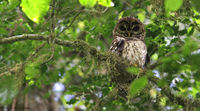| Fulvous Owl | |
|---|---|

| |
| Scientific classification | |
| Kingdom Information | |
| Domain | Eukaryota |
| Kingdom | Animalia |
| Subkingdom | Bilateria |
| Branch | Deuterostomia |
| Phylum Information | |
| Phylum | Chordata |
| Sub-phylum | Vertebrata |
| Infraphylum | Gnathostomata |
| Class Information | |
| Superclass | Tetrapoda |
| Class | Aves |
| Sub-class | Neornithes |
| Infra-class | Neoaves |
| Order Information | |
| Order | Strigiformes |
| Family Information | |
| Family | Strigidae |
| Sub-family | Striginae |
| Genus Information | |
| Genus | Strix |
| Species Information | |
| Species | S. fulvescens |
| Population statistics | |
| Population | <50,000 |
| Conservation status | Least concern[1] |
The fulvous, or Guatemala barred owl (Strix fulvescens), is a species of owl found within the high mountain forested areas of Central America.
Description[edit]
Fulvous owls are about 16-17 inches in length. The facial disk is light reddish-brown or ochre to light grayish in color with a dark border. The upper part of the body is reddish-brown with white spots; the underside is light cream to a fulvous-ochre and bears rufus-brown vertical stripes. The front of the chest is striated. Females are slightly larger than males.
These owls are also bold, being attracted to imitations of their calls, which is a who-wuhu-woot-woot series of low and short hoots done in a rhythmic sequence.
Habits[edit]
Fulvous owls are generally nocturnal, feeding on small mammals, birds, reptiles, frogs, and insects. They are sometimes seen at dusk and dawn, as well as a mid-afternoon appearance. When at rest they seek out dense, shady foliage or cave entrances.
They nest in tree hollows, with the females laying two to three eggs, sometimes as many as five. The eggs are incubated primarily by the female for a period of 28 to 30 days.
Range and habitat[edit]
Fulvous owls live in humid, montane pine oak forests - often called "cloud forests" - of the states of Oaxaca and Chiapas in southern Mexico to Guatemala, Honduras, and El Salvador. Its mountainous range extends from 3,900 to nearly 10,000 feet in elevation[2].